YOU DON'T NOMI Interview: Director Jeffrey McHale on the Unique Legacy of Paul Verhoeven's SHOWGIRLS
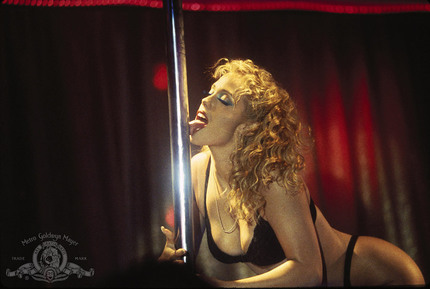
After the success of Basic Instinct, director Paul Verhoeven joined forces again with screenwriter Joe Eszterhas for another highly provocative and sexually-charged film, the biggest NC-17-rated studio release ever: Showgirls, which follows a young woman (Nomi played by Elizabeth Berkley, who at the time was famous for the TV show Saved by the Bell) during her adventure in the Las Vegas showbiz, where she begins working as a stripper to later join the cast of a top musical show lead by star Cristal (Gina Gershon) and director Zack (Kyle MacLachlan).
No one really anticipated what was coming after Showgirls was unleashed in September 1995. It was reviled and mocked by film critics, ultimately bombed at the box office, and the Dutch director gained notoriety when he, in an unprecedented way, showed up at the Razzie Awards to receive not one but seven trophies. “The worst thing happened to me today, I got seven of the worst awards and I’m very happy because it’s much better, much more fun, than reading the reviews in September”, said the great Verhoeven at the 1996 Razzies. But, as a matter of fact, the weird journey of Showgirls (an unbeliavable film that is chock-full of dirtiness and ridiculousness and that also reveals show business as a sewer) was just beginning.
Jeffrey McHale’s documentary You Don’t Nomi (available on Demand and Digital on June 9th) gathers a rich variety of takes on the divisive Showgirls, inspiration for incessant critical thought, books, poems and a musical; also a genuine cult phenomenon that over the years has been revalued, embraced by the queer community and enjoyed by the “so bad it’s good” and the midnight movie crowd, though, on the other hand, there are certainly critics who doesn’t buy any of this and still hate it or view it as misogynistic.
Verhoeven himself has changed his discourse, for example in the documentary there's footage of him comparing the "fun" and "misunderstood" over-the-top style of Showgirls to German expressionist paintings. “You laugh, you don’t believe me… I invented this theory yesterday”, joked Verhoeven in 2016. Yet according to one of the doc’s interviewees, actor MacLachlan has recalled that everybody on the set of Showgirls were aiming at creating a serious film and nothing else.
So, is Showgirls a piece of shit? A legit masterpiece that was ahead of its time? Or a peculiar “masterpiece of shit”? Those are pretty much the questions at the core of You Don’t Nomi, a documentary that also works as a visual essay and an exploration of Verhoeven’s career, from his Dutch films (such as Turkish Delight and Spetters), his unique Hollywood period (including the sci-fi classics RoboCop, Total Recall and Starship Troopers), to his eventual return to Europe (being Elle the most notorious of his recent efforts). I talked about all of these subjects with director and editor Jeffrey McHale.
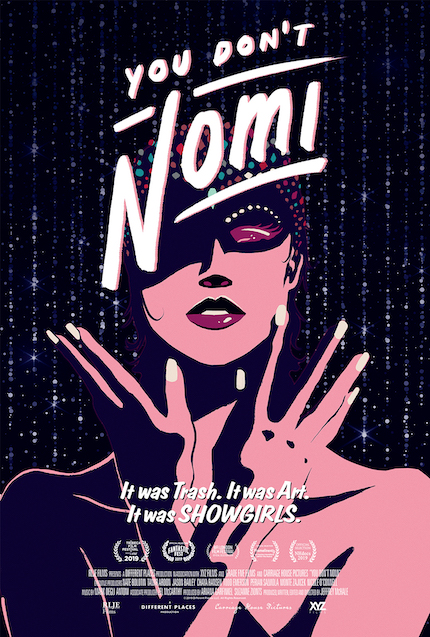
ScreenAnarchy: SHOWGIRLS has a fascinating and very strange history. What was your initial connection to this film?
Jeffrey McHale: I came to it late in life, after it came out. I was way too young to see it in theaters when it was fist released so it took me about 10 years to finally see it and it was after a friend of mine, we were hanging out one night in his apartment when I was living in Chicago and he found out that I hadn’t seen Showgirls and he, you know, pop the DVD in and we watched it right there. My mind was kind of blown, everyone always remembers the first time they seen it [laughs] and I still to this day can remember just being with my eyes widen and I just couldn’t believe that this is what I was gonna see. It was just an amazing experience, one that I’ll never forget.
Film criticism, film analysis, unique takes on SHOWGIRLS are at the core of YOU DON’T NOMI. For me it was very interesting how you edited the documentary, contrasting opinions; for instance there’s this critic who talks about the importance of mirrors and what they mean, and then you get this other critic who’s like “mirrors? really?”, so how important was to not only have different opinions but making an emphasis on this through editing?
Yeah, that was one of the things that was really important to me, was to kind of cover the wide range of critical thought on Showgirls. Thankfully, I first started with all the people that had written or basically created some sort of Showgirls… writing, art, music, you know, whatever, and got thorough opinions about it. Then set out to find voices who still might not like the film or critics who refuted negatively then and still kind of think poorly about it now. And so I really wanted to juxtapose those moments and those ideas because it was important.
I’m a fan of the film for sure but I know it has flaws and it’s uniquely flawed, I just didn’t want gush over it for 90 minutes, I wanted to have an honest conversation about the film and the thoughts around it, so it was really important to me that I juxtapose those themes and those thoughts.
You also chose to edit the documentary sometimes more like a visual essay, especially when you highlight that a theme like revenge or violent sex is present in several films by Verhoeven. Or when you play a little bit and incorporate SHOWGIRLS elements into ROBOCOP or TOTAL RECALL. Why did you decide to make it more inclined to the visual essay documentary?
Part of my research was, I felt like I needed to go back and see all of Verhoeven’s earlier films, ‘cause growing up in America I had only been exposed to the action blockbusters: RoboCop, Total Recall and Starship Troopers. So I felt it was important to go back and look at his early work. And when I did that, I just was fascinated at seeing all the similar motives, just kind of recurring moments and visual cues sprinkled all throughout his work, and a lot of those I connected back to Showgirls itself.
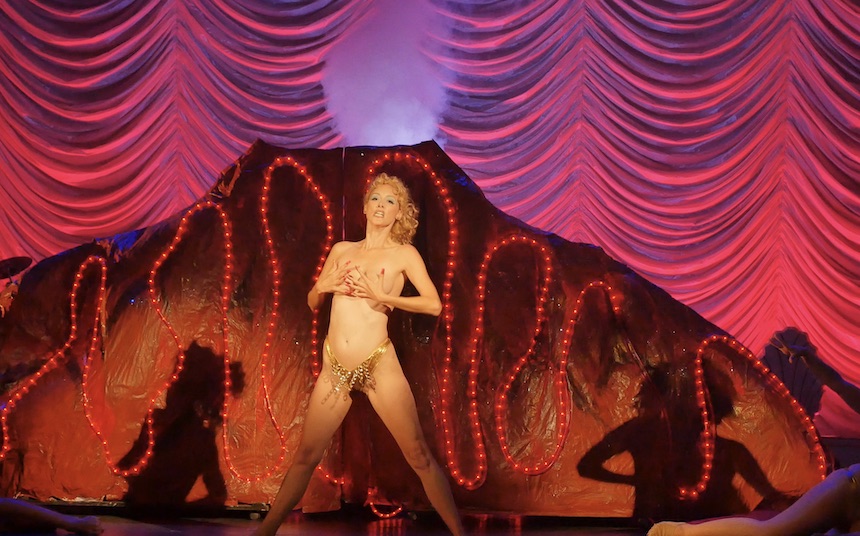
A lot of the strange and confusing things that we celebrate in Showgirls kind of reappear early in his career so I wanted to find a way to make a new subplot and connect Showgirls with the rest of Paul Verhoeven’s films, but I thought by taking his films and the characters in those films and connecting them to the experience of our contributors and the characters in Showgirls itself, there’s a visual opportunity, it was a great way to do a couple things at once.
When exploring Verhoeven’s filmography, there’s also a conflict that feels important in the documentary: the treatment of women, obviously very relevant nowadays in this post-Me Too context. Your film has women who think he has misogynistic views but also women who feel completely different about this. I know it’s complex but how do you feel about Verhoeven’s treatment of women in film?
That’s a tough question, there are so many things to point to that seem kind of problematic about, you know, a lot of the decisions that he made throughout his career. But one thing I found that was interesting was talking to the wide range of people, of view points on this. A film doesn’t have to have feminist ideals kind of guiding the production in order for people to find feminist messages and values within it, and that was one of the more interesting things about the process, was just seeing the complex ways that people can draw upon art and film and connect with them at a real deep level.
Now that you mention the varied takes, I found some cool and unexpected ones at least for me, like the connections SHOWGIRLS has with VALLEY OF THE DOLLS, COBRA WOMAN and that show SAVED BY THE BELL. What was for you the most fascinating discovery in that sense of connections and references?
Yeah, I love Jeffery Conway the poet, the trilogy of camp, you know, when I stumbled upon his book of poems [Showgirls: The Movie in Sestinas] he kind of highlights Valley of the Dolls, Mommie Dearest and Showgirls; to me, after seeing those collected together I was like “oh, those are the perfect trilogy” if so you could say. I did a little math on my own and realized that those films are all 14 years apart too, so they all are very evenly spaced throughout the last century, and so it’s a further interesting thing that each generation has their film that they’re drawn to and that’s a camp classic.
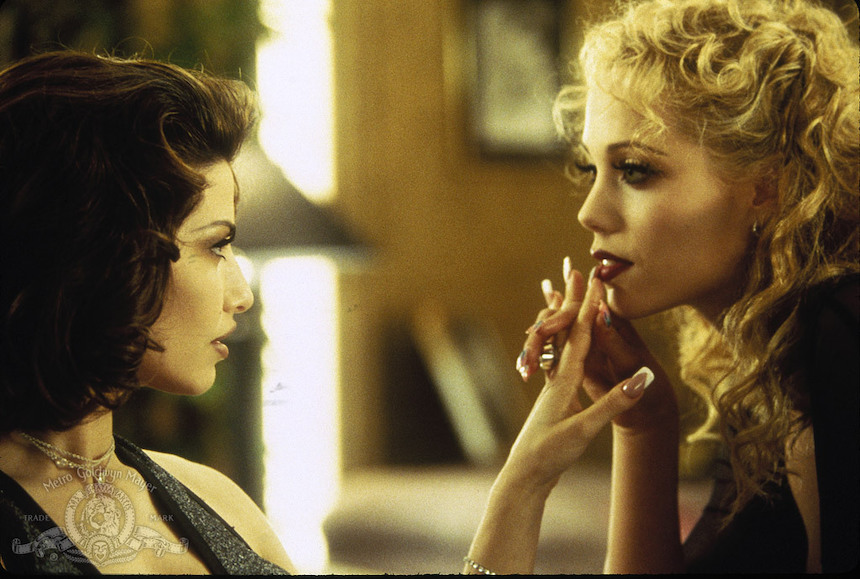
SHOWGIRLS was a bomb, a critical disaster but then it became a cult favorite, midnight favorite, queer favorite and so forth. It’s also interesting how the filmmakers change their own views, so how do you feel about the side of filmmaking when a movie kind of doesn’t belong anymore to the creator?
Yeah, I think that’s one of the interesting things about it and why I didn’t really want to make a behind-the-scenes making-of, specifically with something like Showgirls. I think what makes it what it is today is what audiences have made it and the way that it’s been celebrated and the way it’s still complex; it’s one of those things that we can still enjoy but we can also look at in a critical way too, that’s important.
It’s kind of beautiful that the queer community took something in that was rejected in the way it was rejected by mainstream audiences, and it was mocked and ridiculed. The queer and cult community celebrated it, we worked it into the fabric of our culture, it’s part of the queer lexicon, if you know someone enough you know you can throw a Showgirls reference, if someone gets it, you kind of have a better understanding of them too, you know. Is a way that we can connect with each other.
At some point the documentary also make us learn more about Verhoeven’s career in his native country and then this exciting chapter with his peculiar blockbusters. First of all, for you what’s the essence of his filmography and also what’s the importance and the legacy right now of Verhoeven?
Interesting. I would say he’s a provocative filmmaker and he always likes to push buttons, he’s a filmmaker who likes to take risks and tries to push boundaries. I think that is always number 1, that’s what he likes to do. You can still see that to this day with his more recent films, he still pushes those boundaries.
He has a very unique point of view, I think, that runs through his entire career. Showgirls sits firmly in the middle of it, I think Showgirls is uniquely Verhoeven, it’s Verhoeven at his purest, even to this day, I mean he still says it’s one of his most beautiful films that he’s made, and most elegant he says; so even to this day he’s still a fan of a film that technically derailed his Hollywood career, but, you know, he’s still making films over in Europe.
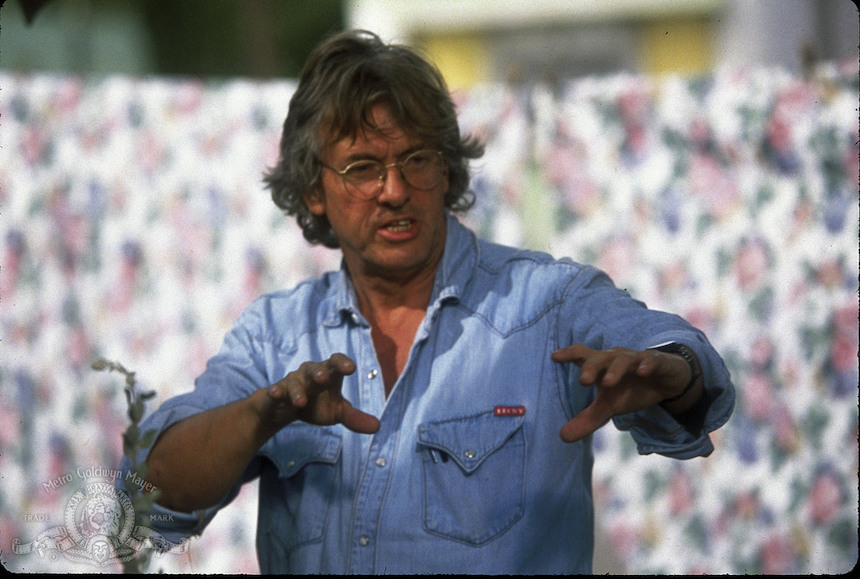
You explore the so-called cult film and how today with movies like SHARKNADO, which are intentionally over-the-top and so forth… do you think we can still have genuine cult phenomenons like SHOWGIRLS?
I don’t think so ‘cause when you have stuff like that, with like Sharknado and this kind of intentional camp, it leaves you empty, leaves kind of a little bit of an empty feeling ‘cause you know everyone is in on the joke and everyone is making decisions for laughs. So I think that’s one of the most interesting things about Showgirls, when you have a film like Showgirls, is that you feel that it was played for the seriousness, with like failed seriousness.
One of the closest examples we have to that now would probably be The Room [directed by Tommy Wiseau], and that also has its own cult following, but they’re still two very different films, one was created in the big studio system in Hollywood and the other one was a small independent film. They still have very similar reactions to them, what makes them special and what draws people to them. I don’t think you’ll have this loyal fan base of something like Sharknado, you can maybe watch it and kind of enjoy it, but you won’t have people celebrate it like you do with these other cult films.
I know you are a fan of SHOWGIRLS, but still what take are you more inclined to? Is it trash? It’s “so bad it’s good”? Is it a serious masterpiece? Or is it everything?
It really is everything, you know, it’s hard to define it because it’s so different for every person and it’s a unique film in that nature where you have to look at everything in whole with it, because there are so many complex and complicated things within it. So I just really lean more for the “masterpiece of shit” argument.







